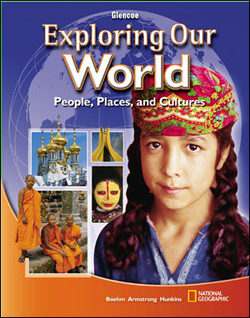
Exploring Our World: People, Places, and CulturesChapter 20: History and Cultures of Africa South of the SaharaChapter OverviewsHigh developed societies have prospered in Africa south of the Sahara for thousands of years. In ancient Africa, the migrations of the Bantu people spread a common language and technology. Later, powerful kingdoms emerged. The wealthy Kush civilization developed in East and southern Africa around 800 B.C. During the A.D. 300s, the Kush were defeated by the Axum, a stronger civilization that prospered from trade. The West Africa trading empires of Ghana, Mali, and Songhai emerged from the A.D. 800s to the A.D. 1500s. Beginning in the 1400s, Africans saw greater trading with Europeans. Their arrival changed the region dramatically. Europeans increased the slave trade and sent nearly 12 million Africans to the Americas, destroying homes, families, and entire communities. before their countries eventually achieved independence. Even when the trade ended in the 1800s, Europeans did not leave Africa. Rather, countries claimed different colonies in Africa to exploit Africa’s raw materials. It wasn’t until the last half of the 1900s that Africans achieved independence from European rule. This freedom, however, brought many challenges. Civil wars plagued many countries because of ethnic differences. South Africa also had a system of apartheid that separated ethnic groups and limited the rights of black South Africans. In the 1990s, this system was finally changed. Africa south of the Sahara has a rapidly growing population, which has brought many challenges to the region. In urban areas, there is pollution, overcrowding, and poor sanitation. In rural areas, many people lack clean water, food, and good sanitation. Disease is also rampant, so health care is a big concern. AIDS has had an especially destructive impact on the region. Most of the population lives in rural villages and works in agriculture. People in rural areas tend to live in extended families. People in the cities work in businesses or factories, and nuclear families are more common. Africans belong to many different ethnic groups, speak thousands of different languages, and practice a variety of religions. The most widely spoken language is Swahili. European languages are also spoken in the region, and in some countries Arabic is an official language. Most people in Africa are Christian or Muslim, but hundreds of traditional religions are also practiced. The cultural traditions in music, art, and dance of Africa have also influenced cultures around the world. |  |















